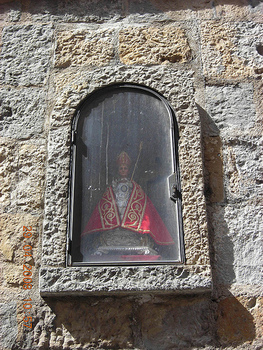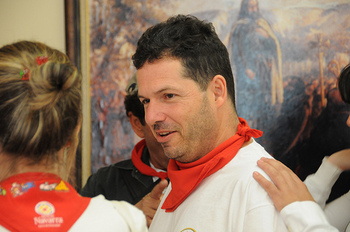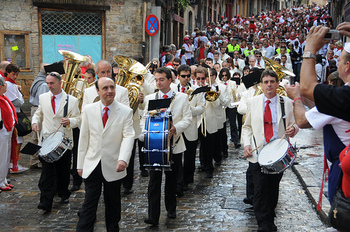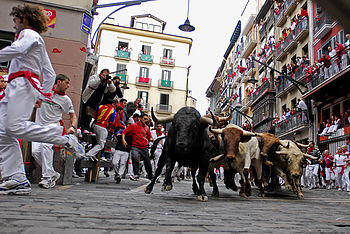San Fermin
The Festival of San Fermin (Fiesta de San Fermin) is best known for its „el encierro“ or running of the bulls.
It is organized from 7th to the 14th of July in city of Pamplona (in Basque Iruña, Iruñea) which is located in the Navarre region of northern Spain.
 San Fermin, patron saint of Pamplona
San Fermin, patron saint of Pamplona
San Fermin is the patron saint of Pamplona. He is the saint of cobblers, winemakers and bakers.
Everything became huge tourist attraction after writer Ernest Hemingway had described the encierro in his novel “The Sun Also Rises” (1926). The novel is also known as “Fiesta”.
 Participant in the San Fermin festival
Participant in the San Fermin festival
Participants wear all white and tie a red handkerchief (the “pañuelo”) around their neck. Some also have red sash (the “faja”) tied around their waist.
 The parade before the main event
The parade before the main event
At least an hour before the encierro participants gather in an area at the beginning of the route called Cuesta de Santo Domingo. There they ask for the protection of the Saint by singing a chant three times.
The encierro starts at exactly 8.00 a.m. The first “cohete” firecracker is lit and the bulls are released from the corral.
 Encierro
Encierro
The second firecracker, which follows shortly, signals that all the bulls left the corral.
During the encierro hundreds of participants run in front of six bulls and six steers through narrow streets of old Pamplona. The route is 825 metres long. Along the route there is a security fence made of over 3,000 wooden parts.
The whole event is quite dangerous. Injuries and even fatalities are very common.
Stray bulls can become very distracted. That is why a "second wave" of "cabestros" (tame steers) is sent by the organizers to run down the route after the "first wave”. Those tame steers collect any stragglers.
Everything finishes at the Pamplona’s Plaza de Toros.
When all of the bulls have entered the arena the sound of third firecracker can be heard, while the fourth firecracker shows that the bulls are in their bullpens and the run is finished.
 The final event in Pamplona's Plaza de Toros
The final event in Pamplona's Plaza de Toros
Some participants of the encierro stay in the arena waiting for yet another attraction."Vaquillas emboladas” (young cows with wrapped horns) are released among the passionate crowd.